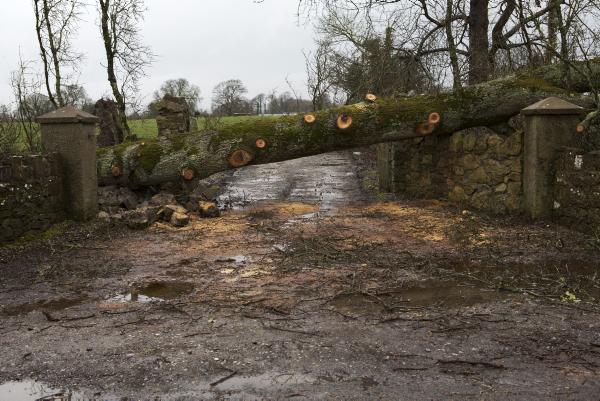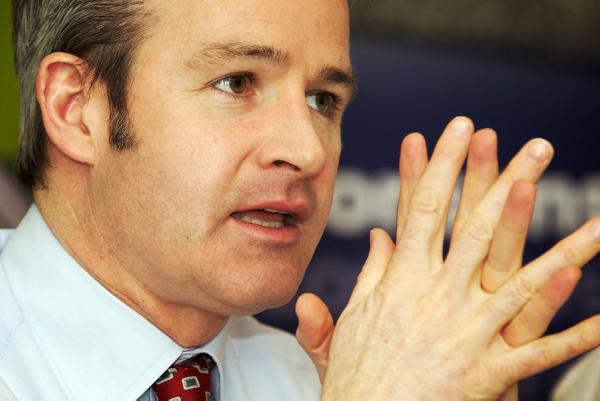FBD has reported a sharp fall in profits for the first six months of the year. Operating profit was down from €24.1m to €5.4m, a decline of 78%. Profit before tax was down €15.8m to €3.3m.
The company is blaming the increased cost of severe and persistent weather, and increased frequency of car insurance claims. Some 9,000 customers were directly impacted by the severe weather which cost €44.3m. However, when reinsurance is taken into account, it cost the company €15.3m. Storm Darwin alone cost €30.4m and €7.8m net of reinsurance.
FBD CEO Andrew Langford said the nature of the business, with a high penetration in rural areas, leaves it more exposed to storms such as those experienced earlier this year. Of the €44m storm cost, €27m related to farming and affected 7,000 customers. While the largest claims were in the region of €250,000, the average claim was €5,000.
He noted that this was the business FBD was in – to be there for its customers and settle claims promptly when such events occur. He added that the occurrence of weather events over a multi-year time horizon was already priced into premium levels and he had no plans to increase FBD’s farm and property insurance rates on account of the severe weather in the first half.
Motor claims
The second factor that affected profits was the increased number of car claims, according to Langford. This increase had been sharper than expected due to an increase in economic activity.
This is set against a market that has been challenged for some time. The Irish insurance industry is highly fragmented with a large number of players (seven control 80%). This, coupled with recent market contraction, has made for very aggressive pricing policies. Insurance Ireland says that for every €100 taken in by the Irish car insurance market, €112 has been paid out, making the segment unprofitable for some time. He added that although rates have risen, it looks like rates will have to increase further to balance this.
As the economy has moved from contraction to recovery, increased activity has led to higher claims frequency. An economic indicator used to demonstrate this is the retail sale of fuel, which is up 9% compared with the same time last year. This shows that more kilometres are now being driven.
Gross written premiums increased to €184.9m. Langford said that “the business growth of 5.1% is the strongest rate of growth in some time”. He added that the company was selling more policies across all sectors and that the market in rural areas and businesses has stabilised. He said its No-Nonsense and consumers brands had also grown. Average premiums increased 3.1% while policy volume increased 2%.
The group increased its market share during the first half and uptake of the recently launched livestock theft cover is better than expected, said Langford.
He said the group’s increased interim dividend (+8%) to 17c, shows commitment to the progressive dividend policy, reflecting confidence in the future strategy.
FBD’s financial services operations (premium installment services and life, pension and investment broking less holding company costs) made an operating profit of €1.7m, down from €2.2m a year ago. He said that with interest rates at such low levels, it is difficult to attract business in this segment.
On the outlook, he said while there is the increased claims frequency headwind, this is indicative of the economic growth which will provide more opportunity for FBD in the longer term.
Comment
This recent set of numbers underlines the cyclical nature of the insurance business and that earnings will be influenced from time to time by random weather events.
The pace of economic growth does impact profitability in the short term as there is a time lag before rate increases match the claims growth. In the medium term, economic activity increases are positive for Irish companies such as FBD.
Even though the overall insurance market has been contracting for 11 years, FBD has grown its share in 12 of the last 13 years. With the market expected to grow in 2014, the outlook appears promising for the second-largest insurer in the Irish market with a market share of almost 14%.
Over the past 15 years, the group has more than doubled the size of its insurance business. Farming remains at its core, still accounting for about a quarter of its premiums. Although motor insurance has increased in line with overall growth, the business is less exposed to motor today. Motor insurance now accounts for almost 40% of the group’s business and direct motor insurance was the largest driver of revenue last year, adding €11m to turnover (7.5% growth).
Although the share price is down almost 18% since the start of the year, shares were stable yesterday. This indicates the market expected the results, having already reacted negatively in June after FBD announced the 33% cut in guidance. Yesterday the company reaffirmed its earnings guidance of 70-80c per share, subject to no further exceptional weather events arising.






 This is a subscriber-only article
This is a subscriber-only article











SHARING OPTIONS: